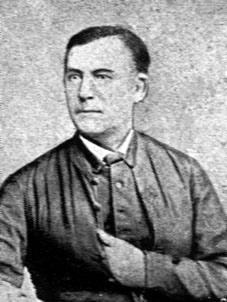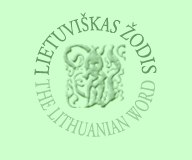 MARTYNAS
SEDERAVICIUS (1829-1907), Roman Catholic priest, booksmuggler, born in
Plegai, county of Sakiai, on October 9, 1829. After graduating from the
theological seminary at Varniai in 1858, he was ordained priest Samogitian
Bishop Motiejus Valancius. In his ordination sermon the latter urged the new
priests to spread
MARTYNAS
SEDERAVICIUS (1829-1907), Roman Catholic priest, booksmuggler, born in
Plegai, county of Sakiai, on October 9, 1829. After graduating from the
theological seminary at Varniai in 1858, he was ordained priest Samogitian
Bishop Motiejus Valancius. In his ordination sermon the latter urged the new
priests to spread
the faith not only by the spoken but also by the written word. Exactly six
years later, as Sidaravlcius was already working in southern Lithuanian
parishes, the Russian administration prohibited the printing of Lithuanian
books in Latin characters. This set the direction of Sidaravicius' life's
work: providing manuscripts for, and organizing the underground distribution
network of Lithuanian religious books printed in East
Prussia (Lithuania Minor). As pastor of the border town Sudargas
(1873-1899), he translated religious texts from Polish, engaged other
priests in the same task, and sent these manuscripts across the border to be
printed in Tilze (Tilsit). In the preparation
of the texts he was assisted mainly by Juozas Antanaitis (1885-1887) and
Serafinas Kuseliauskas (1880-1889), who as a landowner was also able to help
defray printing expenses. With his collaborators Sidaravicius managed to
print over 30 publications in tens of thousands of copies. In the beginning,
he himself transported the books to Lithuania, using his reputation as a
self-denying and universally respected priest to good advantage with the
border patrol. But as the quantity of Latin-character publications visibly
increased within Lithuania and the border patrol received orders to tighten
its surveillance, he was compelled to recruit others to do the task as
volunteers or for money. As soon as the books had been brought over the
border, he personally undertook their distribution to parishes throughout
southern Lithuania. Traveling by night, he would leave bundles of printed
material at agreed locations to be picked
up by other distributors, which included both clergy and lay people. Some of
them were discovered by the Russian police and deported to Siberia.
Sidaravicius himself, though
searched many times, succeeded in avoiding this fate. The underground
network which he had established came to be used by activists Interested in
promoting Lithuanian nationalist and anti-Russian rather than specifically
religious literature. In this way,
although personally committed only to the religious education of his fellow
countrymen, he helped lay the foundations of the entire national reawakening
movement. He retired in 1899 and died in Sudargas on March 7, 1907.
Literature:
ENCYCLOPEDIA LITUANICA I-VI, 1970-1978, Boston

